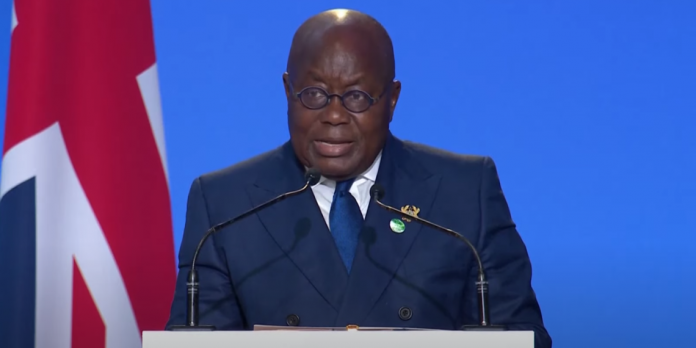President Nana Addo Dankwa Akufo-Addo has stated that the unanimous decision taken by the Supreme Court in its ruling on the voting rights of Deputy Speakers should put the matter to rest.
He indicated that Articles 102 and 104 of the Constitution made it absolutely clear, “in black and white”, that the Deputy Speakers, when they were presiding, had the right to participate in the vote of the Parliament.
In an interview with the media on the sidelines of the Dubai Expo 2020, the President expressed surprise at the furore that was generated on whether or not Deputy Speakers of Parliament could vote, once they were presiding in the chamber.
“As far as I can see it, and I think the Supreme Court has confirmed it, the matters involved in this are open and shut, they are black and white. There can be no dispute about the issues
that the gentleman took to the Supreme Court,” he stated.
No judicial influence
The President insisted that the decision of the Supreme Court on the voting rights of Deputy Speakers could not amount to judicial interference in the work of Parliament.
“Indeed, and I believe that is part of the reasoning of the Court, all the Legislatures of the world, where the presiding person is a Member of the Legislature, like our Deputy Speakers are, like the Speaker of the House of Representatives in the United States of America or the President pro tempore of the Senate in the United States, or the Speaker of the British Parliament have the right to speak because they are Members of the Assembly,” President Akufo-Addo said.
Speaker’s role
The President stated that Ghana’s Speaker of Parliament was expressly not an MP, that was the reason why he did not have the right to vote and he should not participate in the deliberations of the House, adding that “he is a referee making sure that the debate is conducted properly, or the orders of the House are complied with”.
He explained that his role did not include participating in proceedings of the House but that was not the case with the Deputy Speakers, and that matter was transparent on the face of the country’s Constitution.
District Assembly
Citing the example of presiding members in the country’s district assemblies, the President noted that they had the right to vote, because they were members of the Assembly.
“Once you’re a member of the Assembly, and you’re representing certain constituencies, if you are denied your right to vote, it is tantamount to denying the right of the people you represent to have a say in the decisions of the Assembly. That will not be right. So, I could not understand the furore and controversy that was artificially generated,” he said.
First and last comment
President Akufo-Addo said he made deliberate efforts, as much as possible, not to comment on constitutional issues in the country, and that, this is the first time that as President, he had commented on a ruling of the court on constitutional matter, and that would be the last.
“People who are students of our constitutional law, our constitutional jurisprudence, are very much aware of the role that I played when I was a barrister in helping to define some of its basic rules of interpretation. I think that now I have become President, if every time there is a constitutional matter, I’m heard to pronounce on it, it will give the impression that I am setting myself up as some ‘rival Supreme Court’. I am very reluctant to do that, for that reason,” he said.
President Akufo-Addo explained further that the body that the Constitution had set up to be responsible for declaring the meaning of the Constitution, that is, interpreting and enforcing it, was the Judiciary, with the Supreme Court at its apex.
“As a matter of good governance, it is better that, that body, which has been given this exclusive power, is the one that is heard on constitutional issues, and that is the reason why I have not been open or vocal on constitutional matters. But I feel this one I should make some comments,” he added.
Beyond scrutiny
President Akufo-Addo said the suggestion that Parliament was beyond the scrutiny of the Supreme Court was to suggest that Parliament was a law onto itself.
“I’m not sure people who are saying this have actually taken the time to read the Constitution of our country. It says so in black and white. The legislative powers of the State, which is vested in Parliament, is subject to the provisions of the Constitution. All organs of the Ghanaian State, including me as the Head of the Executive, we are all subject to the teachings of the Constitution.”
“There is nobody in the Ghanaian State that is above the fundamental law of the land. It will lead to the very matter that we have striven so long to avoid – the concentration of unregulated power in our state – we don’t want that. And we brought about this Constitution to allow that to not reoccur,” President Akufo-Addo said.
Astonished by what he called public energy dissipated in the debate, he expressed delight at the unanimity of the decision taken by the Supreme Court, especially as it was the most emphatic way in which the Court could make a pronouncement.
Scrutiny
Touching on suggestions that Parliament was beyond the scrutiny of the Supreme Court regarding issues of interpretation, the President indicated that “the whole principle of judicial review was developed by the judges, both in America and England, to be able to check the activities of Parliament.”
In Ghana, he stated that the first major constitutional case, which looked at the work of Parliament was in the case Tuffuor vs Attorney-General, where the Act of Parliament, the decision of the Parliament to subject the then Chief Justice, the late Frederick Kwesi Apaloo, to a vetting process in Parliament, had been expressly forbidden by the Constitution.
“And that is the reason why the late Dr Amoako Tuffuor took the matter to the Supreme Court, and the Supreme Court made it quite clear that all the activities of all the institutions of our Republic that impugn, that violate the Constitution are subject to the powers of the Court and to the Declarations of the Court,” he said.
President Akufo-Addo stated: “I want to repeat it, as President, Head of the Executive, I am subject to the Constitution and to law. I cannot set myself above it. Everybody has his remit, but those remits are subject to the operations of the Constitution, and I am happy that the Constitution has been so declared in such an emphatic manner by the Supreme Court, I support the Supreme Court to continue to do its work.”


